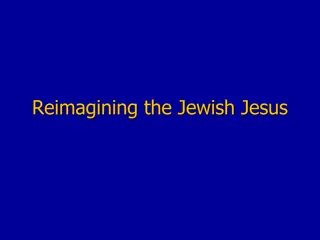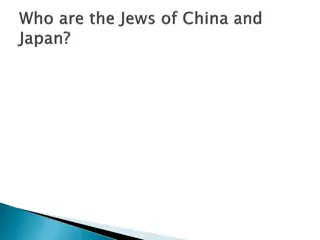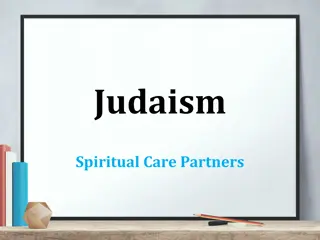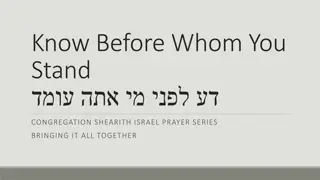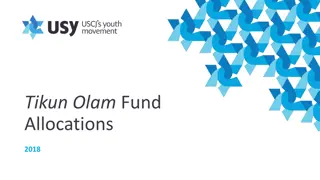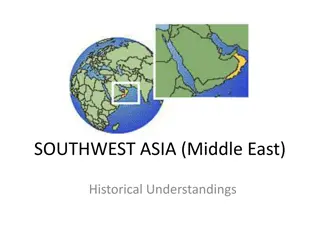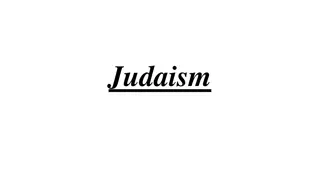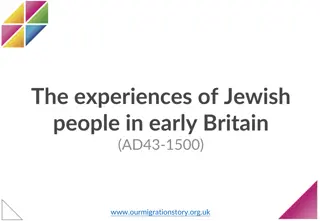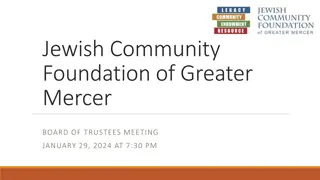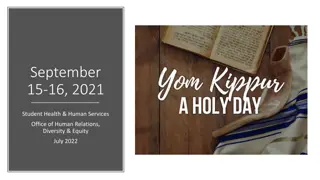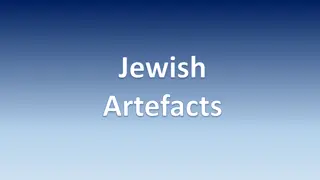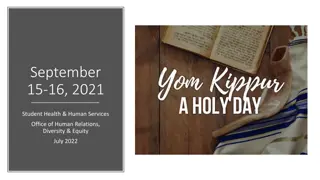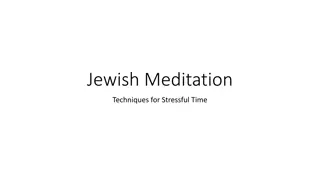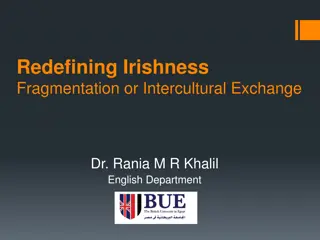Jewish History: Challenges, Identity, and Zionism
Explore the complex history of Jewish identity, the enduring Jewish question, and the evolution of Zionism through key figures like Rabbi Daniel Levine and Theodor Herzl. The essay delves into the ongoing challenges faced by the Jewish people, their struggle for acceptance, and the aspiration for a homeland in Zion.
Download Presentation

Please find below an Image/Link to download the presentation.
The content on the website is provided AS IS for your information and personal use only. It may not be sold, licensed, or shared on other websites without obtaining consent from the author. Download presentation by click this link. If you encounter any issues during the download, it is possible that the publisher has removed the file from their server.
E N D
Presentation Transcript
Survey of Jewish History 15 Rabbi Daniel Levine
The Jewish Question Emancipation Who are the Jews? Asked both Externally and Internally An international nation (peoplehood) A religion that accepts civil law of host state A race
Theodor Herzl and his solution Austrian, 1896 Socialist Atheist Assimilationist
Essay: The Jewish State The Jewish question still exists. It would be foolish to deny it. It is a remnant of the Middle Ages, which civilized nations do not: even yet seem able to shake off, try as they will. They certainly showed a generous desire to do so when they emancipated us. The Jewish question exists wherever Jews live in perceptible numbers. Where it does not exist, it is carried by Jews in the course of their migrations. We naturally move to those places where we are not persecuted, and there our presence produces persecution. This is the case in every country, and will remain so, even in those highly civilized--for instance, France--until the Jewish question finds a solution on a political basis. The unfortunate Jews are now carrying the seeds of Anti-Semitism into England; they have already introduced it into America. I consider the Jewish question neither a social nor a religious one, even though it sometimes takes these and other forms. It is a national question, and to solve it we must first of all establish it as an international political problem to be discussed and settled by the civilized nations of the world in council. We are a people one people. We have sincerely tried everywhere to merge with the national communities in which we live, seeking only to preserve the faith of our fathers. It is not permitted us. In vain are we loyal patriots, sometimes super loyal; in vain do we make the same sacrifices of life and property as our fellow citizens; in vain do we strive to enhance the fame of our native lands in the arts and sciences, or her wealth by trade and commerce. In our native lands where we have lived for centuries we are still decried as aliens, often by men whose ancestors had not yet come at a time when Jewish sighs had long been heard in the country. . . Oppression and persecution cannot exterminate us. No nation on earth has endured such struggles and sufferings as we have. Jew-baiting has merely winnowed out our weaklings; the strong among us defiantly return to their own whenever persecution breaks out. . .
Zionism: Where should we begin? Zionism as a natural step or inevitable part of Jewish tradition Next year in Jerusalem Ingathering of the exiles Zionism as a return Which groups would want to advance this view? Zionism as a departure from Jewish tradition Because of our sins we have been exiled from our land (Holiday Mussaf) "Israel is to be redeemed by penitence alone"-Maimonides Judaism as a universality tradition! Which groups would want to advance this view?
Anti-Zionism from a Jewish Perspective Hermann Cohen: This politico-religious orientation of ours constitutes, for all practical purposes, the difference between us and Zionism. While the Zionist believes that Judaism can be preserved only by an all-encompassing Jewish nationalism, we are of the opposite view, believing that only a universal, mankind-oriented Judaism can preserve the Jewish religion Yoel Teitelbaum (Satmar Rebbe): There is no doubt that the death of the six million Jews was due to the concept of having a State!....the Zionists are always stirring up trouble and placing the Jews in terrible danger. The Torah says that we must not ignore the blood of our brother! And yet people are silent! Even in the United States the Zionists struggle to bring about anti-semitism, just as they did in Europe. We need tremendous mercy from G-d to prevent them from succeeding, because with their slander and arrogance they could bring it about.
Ahad HaAm and his different Question The Jewish State and Jewish Problem (1897) It is not only Jews who have come out of the Ghetto: Judaism has come out, too. For Jews the exodus is confined to certain countries, and is due to toleration; but Judaism has come out (or is coming out) of its own accord wherever it has come into contact with modern culture. This contact with modern culture overturns the defences of Judaism from within, so that Judaism can no longer remain isolated and live a life apart. The spirit of our people strives for development: it wants to absorb those elements of general culture which reach it from outside, to digest them and to make them a part of itself, as it has done before at different periods of its history. But the conditions of its life in exile are not suitable. In our time culture wears in each country the garb of the national spirit, and the stranger who would woo her must sink his individuality and become absorbed in the dominant spirit. For this reason Judaism in exile cannot develop its individuality in its own way. When it leaves the Ghetto walls it is in danger of losing its essential being or -- at best -- its national unity: it is in danger of being split up into as many kinds of Judaism, each with a different character and life, as there are countries of the Jewish dispersion . (what we need is) to establish a State which will be a Jewish State, and not merely a State of Jews.
Revisionist Zionism Ze ev Jabotinsky Romanticized elements of Jewish Nationality and Traditionalism Anti-Socialist Eventually became the Irgun and typically supported greater Israel Menachem Begin (Likkud) Ariel Sharon Bibi
Rav Kook and Religious Zionism The old shall be made new and the new holy Politics as vehicle for Religious ends Secular Zionists may think they do it for political, national, or socialist reasons, but in fact the actual reason for them coming to resettle in Israel is a religious Jewish spark ("Nitzotz") in their soul, planted by God. Without their knowledge, they are contributing to the divine scheme and actually committing a great Mitzvah. The role of religious Zionists is to help them to establish a Jewish state and turn the religious spark in them into a great light. They should show them that the real source of Zionism and the longed-for Zion is Judaism and teach them Torah with love and kindness. In the end, they will understand that the laws of Torah are the key to true harmony and a state that will be a light for the nations and bring salvation to the world.
Early Zionism First Aliyah 1881-1903 Eastern Europe + Yemen Chovevei Tzion In 1900 total people in land were 500,000 85% Arab Muslims/Christians 10% Jews 1901: The Jewish National Fund (JNF) is established with the goal of purchasing land in Palestine for Jewish settlement. 1909: The first kibbutz, Degania, is established in Palestine Brewing tension between Jews and Arabs
Benny Morris: Righteous Victims But the major cause of tension and violence throughout the period 1882 1914 was not accidents, misunderstandings or the attitudes and behaviors of either side, but objective historical conditions and the conflicting interests and goals of the two populations. The Arabs sought instinctively to retain the Arab and Muslim character of the region and to maintain their position as its rightful inhabitants; the Zionists sought radically to change the status quo, buy as much land as possible, settle on it, and eventually turn an Arab-populated country into a Jewish homeland. For decades the Zionists tried to camouflage their real aspirations, for fear of angering the authorities and the Arabs. They were, however, certain of their aims and of the means needed to achieve them. Internal correspondence amongst the olim from the very beginning of the Zionist enterprise leaves little room for doubt
WW1 + Collapse of the Ottoman Empire 1916: Sykes Picot Agreement
Balfour Declaration A member of the House of Lords asked Chaim Weizmann, Why do you Jews insist on Palestine when there are so many undeveloped countries you could settle in more conveniently? Weizmann said: That is like my asking you why you drove twenty miles to visit your mother last Sunday when there are so many old ladies living on your street.
British Mandate Palestine 1920-21 - Arab riots, Haganah formed 1922 - British Mandate in Palestine begins 1929 - Hebron Massacre + Palestinian riots 1930 - Passfield white paper 1931 - Irgun/Etzel splits off from Haganah 1936-1939 - Arab Revolt 1937 - Peel Commission 1939 - White Paper. 75,000 Jews allowed over 5 years
Origins of the two State solution Peel Commission
Israel Created from Compromise Geographic Religious Economic
Independence War Nov 30, 1947 -Civil War in Palestine May 15, 1948 -Israel Founded May 15 1948 -Start of the Independence war Results: Palestinian Exodus from Israel Jewish Exodus from Arab countries


